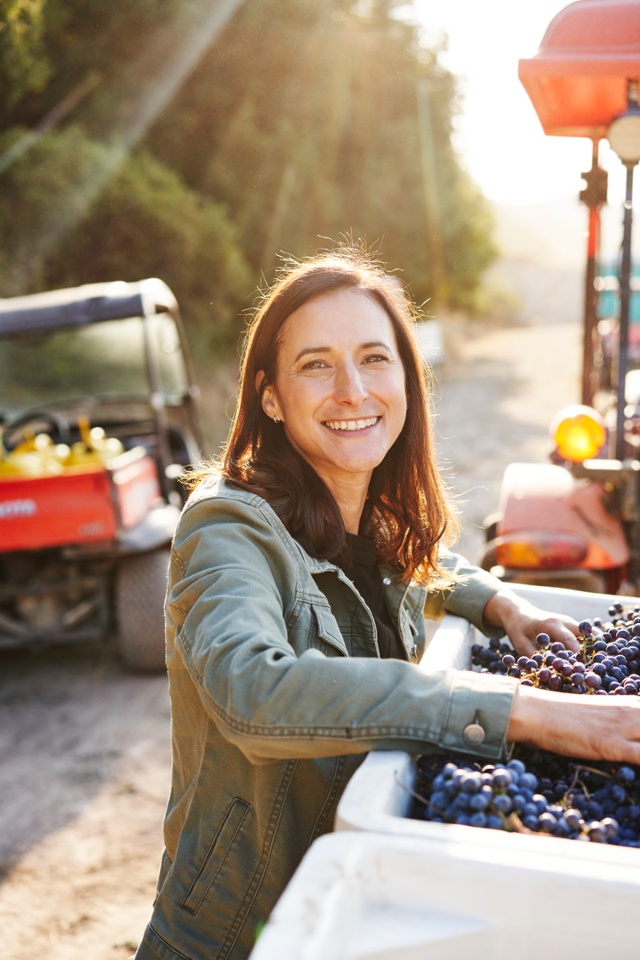Summer 2023
Q&A with Rebekah Wineburg Winemaker, Quintessa

Rebekah Wineburg leads the winemaking operations at Quintessa, where she crafts some of the finest wines in Napa Valley. She talked to Crescendo about her career, her philosophy on winemaking, and what's next.
Read this article in flipbook view
What initially drew you to winemaking, and how did you get your start?
My passion for winemaking began when I was 16 years old. I was visiting the San Francisco Bay Area on vacation with my family, and we took a day trip to Napa Valley. The discussions I heard about winemaking and tasting were fascinating and left a lasting impression. After completing my undergraduate degree, the first thing I did was move to California to work the harvest. I was hooked!
We love your description of wine as a "transformation product": part science, part art, and still a source of mystery. How do you balance the science and art of winemaking and what is your favorite element of mystery?
Winemaking is a fascinating and complex system that cannot be reduced to its parts. I pursued a Master of Science in Viticulture and Enology at UC Davis and believe understanding the chemistry and microbiology underlying winemaking is fundamental. I often must make intuitive decisions, and in that way, winemaking is an art supported by science -- a winemaker must feel a connection with the grapes. No matter how much you study wine, making it remains a mystery because wines are alive and have their own spirit.
"No matter how much you study wine, making it remains a mystery because wines are alive and have their own spirit."
At Quintessa, how do you honor the vineyard's history and tradition while experimenting with new approaches to winemaking?
Agustin and Valeria Huneeus began Quintessa with a very clear vision of what it is: a place that has a soul. And the wine is the expression of the place. We believe the vineyard is the core of everything we do. When we experiment with new technology it is about understanding the property at an even deeper level so that we can continue to care for it and to create a wine that is as transparent as possible to the soul of Quintessa.
Quintessa is a leader in sustainability. Why is this issue important to you and which of your vineyard practices make the biggest impact?
The issue of sustainability is paramount -- not just in our farming and winemaking, but in how we work together as a community. Perhaps the biggest impact for us is from our biodynamic practices. Quintessa has been organic since it was planted, and Valeria introduced biodynamic practices to the property in 1996. Today we are utilizing biodynamic farming to allow the vines to become even more in tune with their soils, more expressive of their terroir, and more resilient to the increasing climate extremes we are experiencing.
You have experience in the wine-growing regions of California, Oregon, Italy, and New Zealand. Can you talk about how your international background has influenced your perspective at Quintessa?
Winemaking is storytelling. The broader international perspective has allowed me to step back and understand what makes our region, and Quintessa, unique -- and to ultimately share that perspective with the world.
What advice would you give to someone interested in pursuing a career in winemaking?
Go for it. Go with an open mind, be ready to get dirty, and to wake up early in the morning!
What can we expect from Quintessa in the future?
An even deeper connection between the wine and the place. After 30 years, we have just begun to reach a level of maturity where we can anticipate what support the vines need as opposed to just react to what they're doing.
Studies have found that our perception of wine is influenced by the music we are listening to while drinking it. And some winemakers even play music for their wine! What role, if any, does music play in your life and work?
Music plays a huge role in my life! My husband is a loudspeaker designer. We have an appreciation of both the art of winemaking and of sound reproduction in our home.